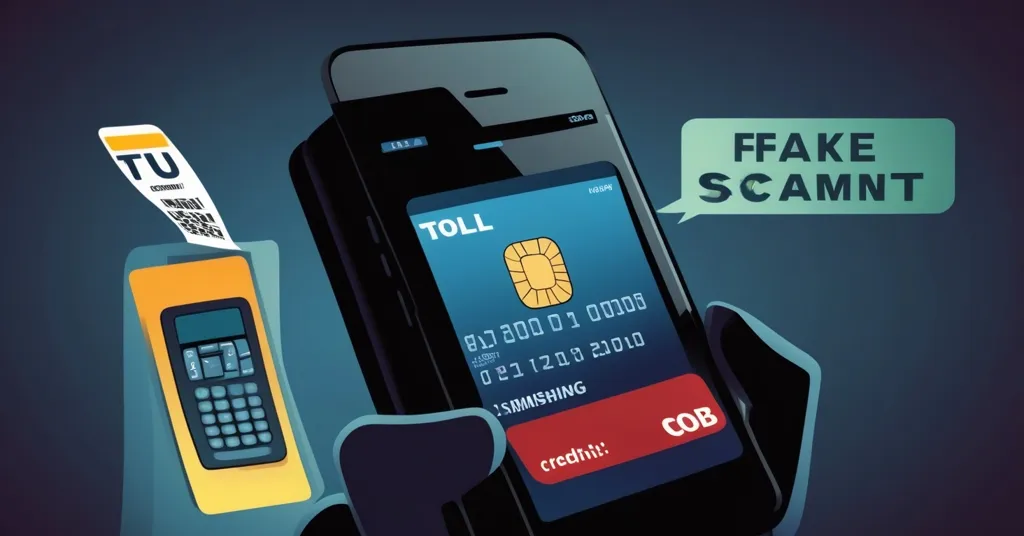Scammers Use Fake Toll Texts to Steal Over 2,000 Americans’ Bank Details

Scammers Exploit Smartphone Users with Fake Toll Texts, Drain Bank Accounts
A new wave of smishing attacks is targeting American smartphone users, with scammers impersonating state toll services to steal debit and credit card information. These fraudulent texts, claiming unpaid highway tolls, have led to over 2,000 reported complaints to the FBI’s Internet Crime Complaint Center (IC3) in the last year, but experts warn the true number of victims could be much higher.
- Over 2,000 complaints to FBI’s IC3 in the last year
- Smishing attacks mimic state toll services
- Fake texts urge immediate payment for unpaid tolls
- Victims risk losing money and personal data
- Scam shifts from state to state
Smishing, short for SMS phishing, is a scam where scammers send text messages designed to trick individuals into providing personal or financial information. In this specific case, the scam begins with a text message that appears to come from a legitimate toll service, warning the recipient of an unpaid toll and urging them to click a link to pay immediately to avoid further fees. This link leads to a fake website designed to mimic an official state toll service, where victims are prompted to enter their debit or credit card information. Once entered, this information is stolen by the scammers, leading to unauthorized transactions and potential identity theft.
Cybercrime expert Michael Skiba estimates that the actual scale of the attack is “astronomical,” with current reporting from victims representing only a small slice of those who are truly affected.
“The actual scale of the attack is ‘astronomical,’ with current reporting from victims representing a small slice of those who are truly affected.” — Michael Skiba, Cybercrime Expert
The scam has been observed to shift from state to state, making it a moving target for authorities and increasing its reach. The FBI advises anyone who receives a suspicious text to report it to www.ic3.gov and to verify any toll debts through official channels rather than clicking on unknown links. To verify toll debts, contact your local toll authority directly or check their official website.
In a world where digital transactions are increasingly common, these smishing attacks highlight the importance of vigilance and the need for secure communication channels. As technology continues to evolve, so too do the methods of those looking to exploit it, making it crucial for individuals to stay informed and cautious. It’s like the scammers are “trolling” with tolls, but this isn’t a game—it’s your hard-earned cash at stake!
While this scam is unrelated to cryptocurrency, the principles of vigilance and skepticism apply equally to the crypto world. Just as with these smishing attacks, crypto enthusiasts must remain wary of scams and fraudulent schemes that could drain their digital wallets. The decentralized nature of cryptocurrencies makes them an attractive target for scammers, underscoring the need for robust security measures and a critical eye. Bitcoin and other cryptocurrencies aim to disrupt traditional financial systems, but this disruption also brings new challenges. As we champion the ideals of decentralization and freedom, we must also acknowledge the dark side of this revolution, where scammers lurk ready to exploit the unwary. It’s a reminder that while we push for effective accelerationism and the adoption of new technologies, we must also push for education and awareness to protect our community.
Here are some key takeaways and questions to consider:
- What is smishing?
Smishing is a form of phishing that uses SMS (text messages) to trick individuals into providing personal or financial information by clicking on malicious links.
- How are scammers targeting Americans with this new scam?
Scammers are sending fake text messages claiming unpaid highway tolls, leading victims to fake websites that mimic state toll services to steal their debit and credit card information.
- How many complaints have been reported to the FBI regarding this scam?
Over 2,000 complaints have been reported to the FBI’s Internet Crime Complaint Center (IC3) within the last year.
- What does the FBI recommend to protect against this scam?
The FBI advises reporting suspicious texts to www.ic3.gov and verifying toll debts through official channels rather than clicking on unknown links.
- Why might the actual number of victims be higher than reported?
Cybercrime expert Michael Skiba suggests that the reported numbers represent only a small portion of the actual victims, indicating that many people may not report the scam or may not realize they have been targeted.



